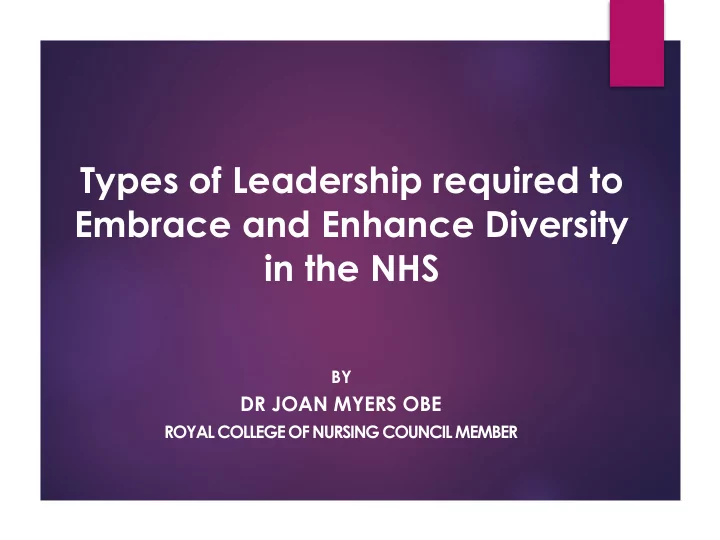

Types of Leadership required to Embrace and Enhance Diversity in the NHS BY DR JOAN MYERS OBE ROYAL COLLEGE OF NURSING COUNCIL MEMBER
Aim � The Wicked Issue � Challenges � Unconscious bias � Leadership Styles/behaviour/skill � Conclusion: Cultural Intelligence
Wicked Issue � The NHS local workforce in London have been between 20% - 50% Black and Minority Ethnic (BME) staff. � The majority of the BME staff in NHS Trusts are represented in the lower bands in the workforce which is consistent with NHS workforce data � A high percentage of BME staff complain of harassment and bullying in their work place and lack of opportunity to be promoted
Challenge � To highlight the issue across the whole of NHS organisation as a serious challenge for all leaders and managers to address the unconscious bias � To nurture, empower and encourage BME staff to progress in the organisation � To empower all to embrace inclusion across the whole organisation so that diversity is embraced and celebrated with cultural intelligence.
Unconscious bias � Unconscious bias describes the prejudice and assumption one person has towards another based on common cultural stereotypes rather than a deliberate thought through judgement. Kandola (2009)
CONCLUSION Cultural Intelligence � Cultural Intelligence or CQ is defined as the capability to be effective across different cultural contexts – including national, ethnic, generational, organisational and other contexts. This is as a result of CQ Drive, CQ Knowledge, CQ Strategy and CQ Action. David Livermore (2013)
Thought Diversity � Thought diversity is the recognition that each individual has a unique mix of identities, cultures and experience that informs how they think, interpret and negotiate and accomplishes a task Thought diversity embraces the full potential of each person in the workforce and their uniquely different ways of thinking. Deloitte 2013
Inclusion ▪ Inclusion is the complete acceptance and integration of all NHS employees regardless of diversity background. ▪ For employees, this proactively leads to sense of belonging, engagement, progression and full participation within the organisation
Authentic leadership � Authentic leaders lead with compassion and therefore are able to influence, inspire and encourage followers to do and achieve their best. This encourages a positive work environment and professional growth and development of staff. Yasinski 2014
Collective Leadership � Emphasises the need for all staff to take the responsibility of ensuring a compassionate culture in the organisation. When leaders create positive, supportive environments for staff the staff will be enabled to provide high quality, safe effective care to the patients. Collective leadership requires all staff to work at solving problems together West et al 2014
Inclusive Leadership � Inclusive leaders get the best out of all their people, helping their organisations to succeed in today’s complex, diverse national and global environment. � Through their skills in adaptability, building relationships and developing talent, inclusive leaders are able to increase performance and innovation Hollander (2009)
Reference List Deloitte University Press (2013) Diversity's new frontier - Diversity of thought and the future of the � workforce. A GovLab Report Hollander EP (2009) Inclusive leadership:the essential leader-follower relationship New York NY: � Routledge Kandola, B (2009) The value of difference - eliminating bias in organisations Pearn Kandola � Publishing Kline R (2013) Discrimination by Appointment: How black and minority ethnic applicants are � disadvantaged in NHS staff recruitment Public World Kline R (2014) The "snowy white peaks" of the NHS: a survey of discrimination in governance � and leadership and the potential impact on patient care in London and England Middlesex University Livermore D (2013) Expand your Borders –Discover 10 Cultural Clusters Cultural Intelligence � Centre LLC West M, Dawson J, Admasachew L, & Topakas A (2012) NHS Staff Management and Health � Service Quality Results from the NHS Staff Survey and Related Data . Lancaster University Management School, The Work Foundation and Aston Business School West M, Eckert R, Stewards K, Pasmore B (2014) Developing Collective Leadership for � Healthcare London The Kings Fund Yasinski L (2014) Authentic Leadership: develop the leader within ORNAC Journal March �
Recommend
More recommend